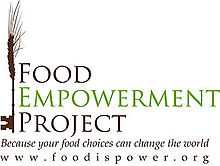Food Empowerment Project

Food Empowerment Project (F.E.P.) is a volunteer-based non-profit organization that seeks to create a more just and sustainable world by recognizing the power of one’s food choices. The organization was founded in 2006 by lauren Ornelas, who continues to lead it.[1]
Organization and mission
The organization is composed of a team of activists from various animal rights, environmental and social justice organizations.[2] They work on encouraging healthy food choices that reflect a more compassionate society by spotlighting the abuse of animals on farms, the depletion of our natural resources, unfair working conditions for produce workers, and the lack of access to healthy foods in low-income areas.[3] In January 2011, the organization began researching companies that make vegan products containing chocolate to find out if they source their cocoa beans from countries where child labor and slavery can still be found. The frequently updated list of companies is available at http://www.foodispower.org/chocolatelist.htm
Reports
In February 2007, Satya Magazine featured an essay by lauren Ornelas titled “Breaking the Food Chains: Liberating the World Through the Power of Our Plate.”[4] In April 2008, the Food Empowerment Project supported California Senate Bill 1443 which would required that a written contract between a retail food facility and a purchaser must include an option that allows the purchaser to direct the facility to donate any leftover food to a non-profit food bank or provide it to the purchaser.[5]
As part of the organization's ongoing effort to emphasize the importance of healthy food choices, in March 2009 the Food Empowerment Project began surveying supermarkets, convenience stores and other retail businesses that sell food in Santa Clara County. The resulting report, Shining a Light on the Valley of Heart’s Delight, published in August 2010, found a number of food-related inequities in the county. For example, it reveals that higher-income areas have more than twice as many large supermarkets per capita as lower-income areas, while lower-income communities have nearly twice as many liquor stores and 50 percent more markets that sell an abundance of meat products. Neither of these types of stores offers a variety of healthy food options, especially fresh fruits and vegetables.
Campaigns
In March 2012, F.E.P. launched its first corporate campaign. The initiative targeted Clif Bar, maker of highly popular energy bars and drinks, for not disclosing where they source their chocolate from.[6] Although the company touts its social responsibility, it continued to ignore requests to divulge the country from which it buys its cocoa beans. This is of concern because two West African countries, Ghana and the Ivory Coast, supply 75 percent of the world’s cocoa market. In recent years, a handful of organizations and journalists have exposed the widespread use of child labor and, in some cases, slavery on West African cocoa farms.[7] F.E.P. first contacted Clif Bar in May 2011.[8] The nonprofit launched its campaign in March 2012 asking consumers to contact Clif Bar and demand transparency in light of the possible connection to child labor and human slavery.[9] On December 2, 2014, F.E.P. declared victory in their campaign, announcing that Clif Bar & Company had publicly disclosed that the sources for its cocoa include the Ivory Coast and Ghana..[10]
See also
References
- ↑ Food Empowerment Project Mission Statement, retrieved on June 17th, 2008
- ↑ Food Empowerment Project Team, retrieved on June 17th, 2008.
- ↑ LA Times Letter To the Editor, retrieved on June 17th, 2008.
- ↑ Satya Magazine Article, "Breaking The Food Chains: Liberating The World Through the Power of Our Plate," by lauren Ornelas, retrieved on June 22nd, 2008.
- ↑ California Senate Bill 1443, retrieved on June 22nd, 2008.
- ↑ Take Action FoodIsPower.org.
- ↑ Humphrey Hawksley, “Ivory Coast accuses chocolate companies,” BBC News, May 4, 2001.
- ↑ Letter to Clif Bar, May 31, 2011 FoodIsPower.org.
- ↑ Take Action FoodIsPower.org.
- ↑ Food Empowerment Project Announces Clif Bar Campaign Victory, Dec. 2, 2014 FoodIsPower.org.